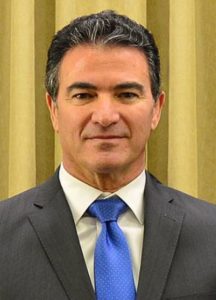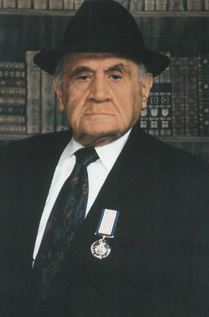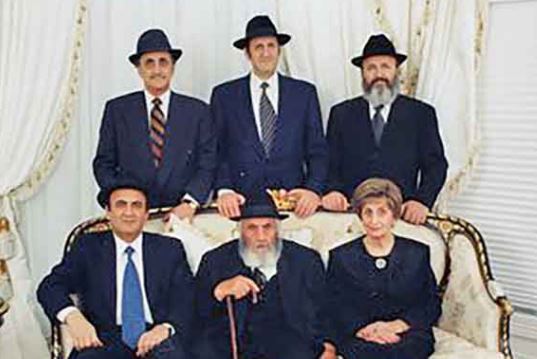The Persian Kingmaker
 Ebrahim “Hajji” Shirazi (1745-1801) was born in the Persian metropolis of Shiraz to a family of crypto-Jews. His grandfather was a wealthy Jewish merchant who was forced to convert to Islam. The family continued to practice Judaism in secret. His father, Mohammad, became the warden of the richest area of Shiraz, as well as the kadkhoda-bashi, the government’s official representative to, and chief administrator of, the large Jewish population. Ebrahim inherited the title and role from his father. He grew even wealthier and more influential, eventually becoming kalantar, the city’s mayor. When the Persian king Karim Khan died, a civil war and power struggle ensued. Ebrahim was able to use his diplomatic skills to place Jafar Khan on the throne, and helped the new king consolidate his rule. He raised an army to defeat Jafar’s enemies, and brokered important deals with the British to support the new regime. Nonetheless, Jafar’s rule didn’t last long, and he was soon replaced by Lotf Ali Kahn, who was in turn replaced by Agha Mohammad Khan. Ebrahim became the latter’s most trusted advisor, and was soon appointed his sole grand vizier. Ebrahim effectively ran the whole Persian Empire henceforth. He continued in this role even after a takeover by a new emperor, Fath Ali Shah. In those days, Persian royalty and government officials were all expected to have multiple wives. Ebrahim, however, had only one Jewish wife. This was one of many reasons he was suspected of not being a true Muslim. Additionally, under his watch multiple new synagogues were opened in Shiraz and Tehran. At one point, Ebrahim went on a hajj to Mecca to try to cover up his Jewishness, and made sure people called him by the nickname Hajji. Nonetheless, the suspicions caught up with him and, together with his immense power and influence, brought the ire of the other Persian officials. They eventually convinced Fath Ali Shah that Ebrahim was his enemy, and the Shah had Ebrahim executed. Tragically, he also executed much of Ebrahim’s extended family. Historians have described Ebrahim Shirazi as a great Persian “kingmaker”, genius diplomat, and even as “one of the best statesmen Persia has ever had”. Meanwhile, the new Qajar dynasty went on to severely increase persecutions and forced conversions of Jews, causing many Jews to flee east to the Khanate of Bukhara, thus providing a large boost to the growing Bukharian Jewish community.
Ebrahim “Hajji” Shirazi (1745-1801) was born in the Persian metropolis of Shiraz to a family of crypto-Jews. His grandfather was a wealthy Jewish merchant who was forced to convert to Islam. The family continued to practice Judaism in secret. His father, Mohammad, became the warden of the richest area of Shiraz, as well as the kadkhoda-bashi, the government’s official representative to, and chief administrator of, the large Jewish population. Ebrahim inherited the title and role from his father. He grew even wealthier and more influential, eventually becoming kalantar, the city’s mayor. When the Persian king Karim Khan died, a civil war and power struggle ensued. Ebrahim was able to use his diplomatic skills to place Jafar Khan on the throne, and helped the new king consolidate his rule. He raised an army to defeat Jafar’s enemies, and brokered important deals with the British to support the new regime. Nonetheless, Jafar’s rule didn’t last long, and he was soon replaced by Lotf Ali Kahn, who was in turn replaced by Agha Mohammad Khan. Ebrahim became the latter’s most trusted advisor, and was soon appointed his sole grand vizier. Ebrahim effectively ran the whole Persian Empire henceforth. He continued in this role even after a takeover by a new emperor, Fath Ali Shah. In those days, Persian royalty and government officials were all expected to have multiple wives. Ebrahim, however, had only one Jewish wife. This was one of many reasons he was suspected of not being a true Muslim. Additionally, under his watch multiple new synagogues were opened in Shiraz and Tehran. At one point, Ebrahim went on a hajj to Mecca to try to cover up his Jewishness, and made sure people called him by the nickname Hajji. Nonetheless, the suspicions caught up with him and, together with his immense power and influence, brought the ire of the other Persian officials. They eventually convinced Fath Ali Shah that Ebrahim was his enemy, and the Shah had Ebrahim executed. Tragically, he also executed much of Ebrahim’s extended family. Historians have described Ebrahim Shirazi as a great Persian “kingmaker”, genius diplomat, and even as “one of the best statesmen Persia has ever had”. Meanwhile, the new Qajar dynasty went on to severely increase persecutions and forced conversions of Jews, causing many Jews to flee east to the Khanate of Bukhara, thus providing a large boost to the growing Bukharian Jewish community.
Are Bukharian Jews Descended from the Lost Tribe of Naftali?
Is it Possible to Reconcile Torah with Evolution?
Words of the Week
God knows what could be done here if you were left alone… The fate of the world depends on the fate of the people of Israel. Make yourself a shining light on a hill.
– Jordan Peterson, in a speech during his recent trip to Israel

 Yosef Meir Cohen (b. 1961) was born in Jerusalem to a religious-Zionist family with deep roots in the ancient city. He is a 9th-generation Israeli, and his ancestors were among the founders of the Mea Shearim neighbourhood, one of the first outside Jerusalem’s Old City walls. Cohen grew up studying in yeshivas and was a member of the
Yosef Meir Cohen (b. 1961) was born in Jerusalem to a religious-Zionist family with deep roots in the ancient city. He is a 9th-generation Israeli, and his ancestors were among the founders of the Mea Shearim neighbourhood, one of the first outside Jerusalem’s Old City walls. Cohen grew up studying in yeshivas and was a member of the 
